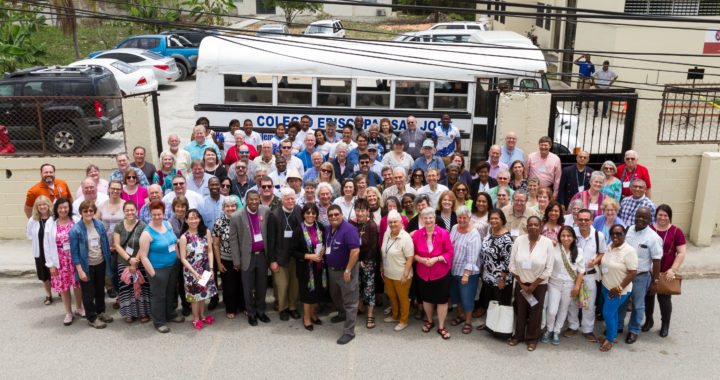Visit Our Conference Highlights Page
Evangelism is highlighted at Global Mission Conference in Dominican Republic
By the Rev. Canon Dr. Titus Presler
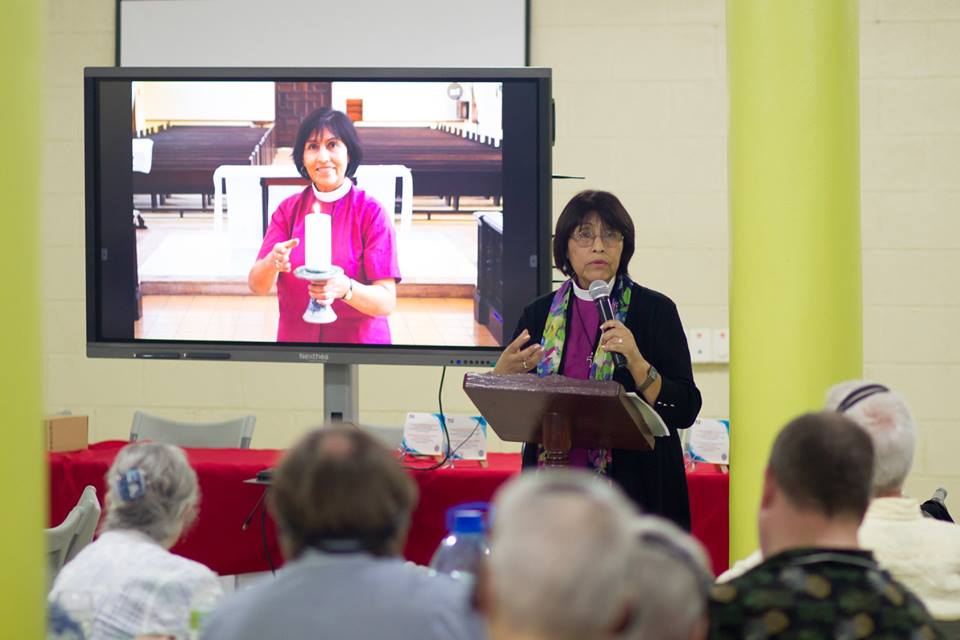
“The gospel is a different news, a radical news,” said keynoter Bishop Griselda Delgado del Carpio of Cuba. “It is the news of knowing that each human being has a dimension inside of themselves that they cannot fulfill without God – the presence of God and the strength of the Holy Spirit. It is news that is different from the dominant culture, where people have so much anxiety and confusion without a horizon. The gospel is the horizon, the space where we are transformed fully. It is radical and coherent. It allows us to find happiness in our lives.”
It took courage for Cuban Christians to witness to their faith in the ideological environment of communism after the Cuban revolution of 1959, Delgado said as she described the steady and multi-dimensional growth of the Episcopal Church in Cuba in recent decades. “We used to say ‘Cuba for Christ.’ Now we say, ‘Christ for the Cuban people,’” she noted in emphasizing the church’s effort to integrate gospel proclamation with the social and economic needs of Cubans today.
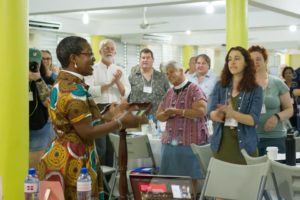 “When we go into different cultures or spaces where Christianity is not the norm, if all we have is Christian superiority, that is not going to fly,” said Spellers, who recently traveled to South Africa. As she shared her own story of seeking “a love that does not disappoint,” she declared, “This is a story I can share with Muslims, with atheists. If you haven’t figured this out, take time to identify the difference Jesus has made in your life.”
“When we go into different cultures or spaces where Christianity is not the norm, if all we have is Christian superiority, that is not going to fly,” said Spellers, who recently traveled to South Africa. As she shared her own story of seeking “a love that does not disappoint,” she declared, “This is a story I can share with Muslims, with atheists. If you haven’t figured this out, take time to identify the difference Jesus has made in your life.”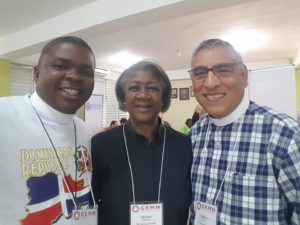 The Rev. Anthony Guillén, director of ethnic ministries for the Episcopal Church, noted how simple greetings can be evangelistic: “When we ask, ‘How are you?’ in the U.S. the response is usually, fine, tired, busy, okay. In Latin culture, the response is always with ‘Gracias a Dios’ added, meaning, ‘Because of God, I am fine.’ There is already a consciousness of God in our lives, proclaimed unashamedly.”
The Rev. Anthony Guillén, director of ethnic ministries for the Episcopal Church, noted how simple greetings can be evangelistic: “When we ask, ‘How are you?’ in the U.S. the response is usually, fine, tired, busy, okay. In Latin culture, the response is always with ‘Gracias a Dios’ added, meaning, ‘Because of God, I am fine.’ There is already a consciousness of God in our lives, proclaimed unashamedly.”
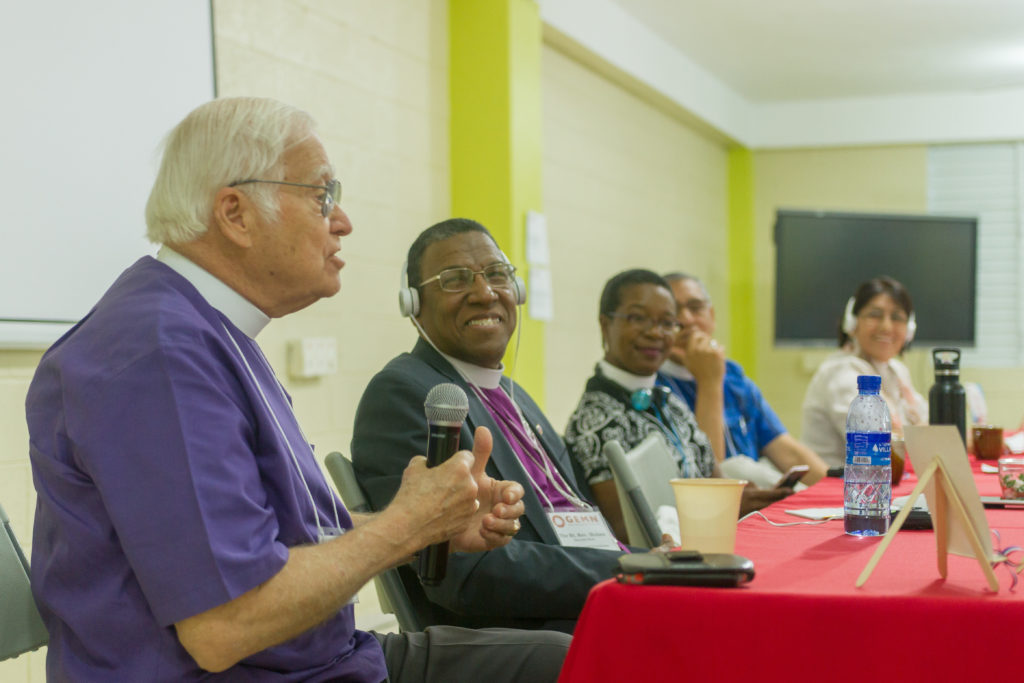
“In GEMN’s 24 years of annual conferences, this is the first conference to focus specifically on evangelism,” I said as president of GEMN in opening the conference. “With the growth of the world church and the intensifying focus on poverty alleviation, the world mission community sent evangelism to the back of the line. As the church as a whole is reviving its commitment to evangelism, we in GEMN feel it’s important to re-integrate evangelism with global mission.”
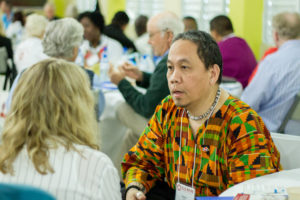 “Evangelism isn’t a dirty word for me,” said Anna Sutterish of the Diocese of Ohio and a senior at Bexley Seabury Seminary as she highlighted generational differences in Episcopal attitudes toward evangelism. “I’m 29 years old and I have no problem with evangelism.”
“Evangelism isn’t a dirty word for me,” said Anna Sutterish of the Diocese of Ohio and a senior at Bexley Seabury Seminary as she highlighted generational differences in Episcopal attitudes toward evangelism. “I’m 29 years old and I have no problem with evangelism.”
Responding to the common question, “Isn’t evangelism disrespectful to non-Christians?” Spellers said, “It’s disrespectful to shove religion at people, to proselytize and denounce other pathways to God. But if you speak with generosity, curiosity and gratitude, then people respond more positively.”
The conference concluded with visits to congregational and medical mission sites on the island. Generous patrons of conference receptions were Bexley Seabury Seminary, the Diocese of Connecticut and the Dominican Development Group.
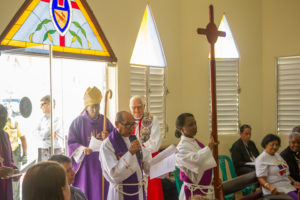 GEMN’s Mission Formation Program preceded the conference, this year enrolling a record 14 participants to spend a day exploring biblical foundations, mission theology, cultural dynamics and the practicalities of catalyzing mission vision and mutuality with companions around the world. The four participants graduating from the two-year program shared their projects. The Rev. Isaias Ginson of the Diocese of Long Island, who served as a missionary in the Pacific, recounted his field research on religious rites among indigenous peoples in the Philippines. The Rev. Dr. Grace Burton-Edwards of the Diocese of Georgia shared her work on GEMN’s curriculum based on “The Way of Love.” Mrs. Christine Mercer of the Diocese of Alabama told of her work in enabling Honduran women to economically manage their monthly cycles without missing school or work. The Rev. Dr. Jim Boston of the Diocese of Oregon shared his work on a memoir about working in GEMN since its inception in 1994.
GEMN’s Mission Formation Program preceded the conference, this year enrolling a record 14 participants to spend a day exploring biblical foundations, mission theology, cultural dynamics and the practicalities of catalyzing mission vision and mutuality with companions around the world. The four participants graduating from the two-year program shared their projects. The Rev. Isaias Ginson of the Diocese of Long Island, who served as a missionary in the Pacific, recounted his field research on religious rites among indigenous peoples in the Philippines. The Rev. Dr. Grace Burton-Edwards of the Diocese of Georgia shared her work on GEMN’s curriculum based on “The Way of Love.” Mrs. Christine Mercer of the Diocese of Alabama told of her work in enabling Honduran women to economically manage their monthly cycles without missing school or work. The Rev. Dr. Jim Boston of the Diocese of Oregon shared his work on a memoir about working in GEMN since its inception in 1994.